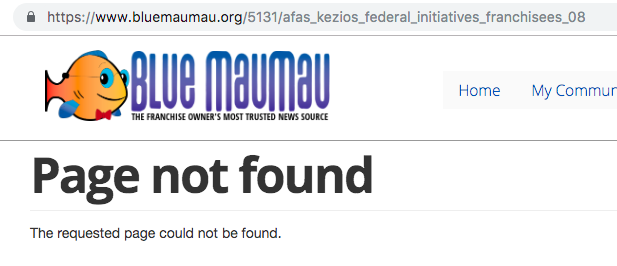The FTC doesn’t enforce the Franchise Rule itself.
And the FTC has resisted allowing for private enforcement of the Franchise Rule.
According to the then president of the American Franchisee Association (AFA), Susan Keizos, when the Franchise Rule was last being revised, the International Franchise Association hired attorneys to fight against allowing franchiSEES a private right of action.
The franchiSORS’ attorneys won and, in 2007, the FTC revised the Franchise Rule without adding measures that would allow for private enforcement.
In a nutshell, that means that the Franchise Rule is both unenforced and unenforcible.
“What good is it, then?” You might ask. My answer: I have no idea. Or… to put it more clearly… it has no value… not to franchisees, anyway.
Why the FDD isn’t Worth Much
On the Coalition of Franchisee Associations’ website it states, “Susan Kezios, chairperson of the American Franchisee Association, told Blue MauMau just how little change there was for franchisees. ‘The Federal Trade Commission labored a dozen years to revise its Franchise Rule — only to give birth to a mouse,'”
Evidently the Blue MauMau article that originally quoted Kezios has been removed from the Internet. and evidently it was removed after the Coalition of Franchisee Associations linked it the article from its website.
Fortunately, WayBack Machine captured a screenshot of the removed page and we can still see what was said before it was (evidently) censored.

Again, censored or not, Kezios wrote, “The Federal Trade Commission (“FTC”) labored a dozen years to revise its Franchise Rule — only to give birth to a mouse.”
“The Rule itself,” she continues, “regardless of its content (or omissions), is toothless. Teeth come in the form of a private right of action. Incredibly, investors who are harmed by franchisor violations of the Rule cannot sue to obtain normal legal redress. Because the FTC has a consistent record of rarely (if ever) enforcing its own Rule, a private right of action would allow franchisees their only remedy for franchisor fraud and material omissions in the 38 states without state franchise registration/disclosure laws. A private right of action would also level the playing field by taking away the unfair advantage of regional franchisors who offer franchises for sale only in non-registration states. Without it, there is no level playing field for franchisees, no checks and balances for franchisors, and no opportunity for the mouse that is the FTC’s revised Franchise Rule to roar.”

Kezios states that “The AFA,” her own organization, “and its members went toe-to-toe with the FTC, the IFA and the IFA’s franchisors attorneys during the entire 13-year process it took to revise the Rule. No other organization entered the picture on franchisees’ behalf until the 11th hour. No [other] franchisee organization was around for all the debating, arguing and mud-slinging that it took to get that one remedial addition in Item 20 into disclosure documents.”
But no private right of action was added to the rule.
The franchiSORS and their attorneys have figured out how to make fraud “legal” and to prevent franchiSEES from having any means of restitution.
In my opinion, the attorneys who have helped the franchiSORS figure out how to make mass fraud legal need to be held accountable, too.




